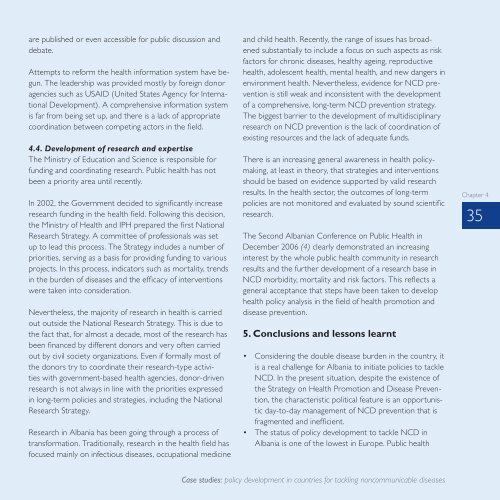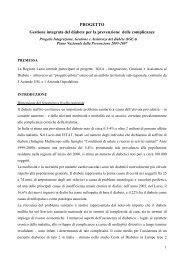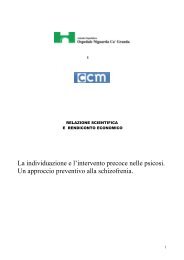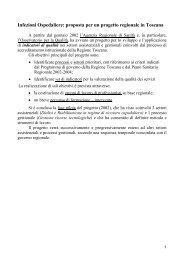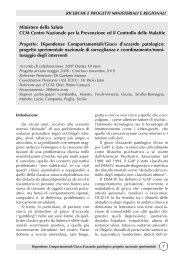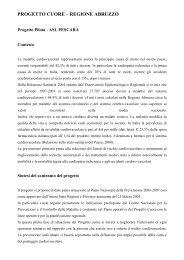Gaining health : analysis of policy development in European ...
Gaining health : analysis of policy development in European ...
Gaining health : analysis of policy development in European ...
You also want an ePaper? Increase the reach of your titles
YUMPU automatically turns print PDFs into web optimized ePapers that Google loves.
are published or even accessible for public discussion and<br />
debate.<br />
Attempts to reform the <strong>health</strong> <strong>in</strong>formation system have begun.<br />
The leadership was provided mostly by foreign donor<br />
agencies such as USAID (United States Agency for International<br />
Development). A comprehensive <strong>in</strong>formation system<br />
is far from be<strong>in</strong>g set up, and there is a lack <strong>of</strong> appropriate<br />
coord<strong>in</strong>ation between compet<strong>in</strong>g actors <strong>in</strong> the field.<br />
4.4. Development <strong>of</strong> research and expertise<br />
The M<strong>in</strong>istry <strong>of</strong> Education and Science is responsible for<br />
fund<strong>in</strong>g and coord<strong>in</strong>at<strong>in</strong>g research. Public <strong>health</strong> has not<br />
been a priority area until recently.<br />
In 2002, the Government decided to significantly <strong>in</strong>crease<br />
research fund<strong>in</strong>g <strong>in</strong> the <strong>health</strong> field. Follow<strong>in</strong>g this decision,<br />
the M<strong>in</strong>istry <strong>of</strong> Health and IPH prepared the first National<br />
Research Strategy. A committee <strong>of</strong> pr<strong>of</strong>essionals was set<br />
up to lead this process. The Strategy <strong>in</strong>cludes a number <strong>of</strong><br />
priorities, serv<strong>in</strong>g as a basis for provid<strong>in</strong>g fund<strong>in</strong>g to various<br />
projects. In this process, <strong>in</strong>dicators such as mortality, trends<br />
<strong>in</strong> the burden <strong>of</strong> diseases and the efficacy <strong>of</strong> <strong>in</strong>terventions<br />
were taken <strong>in</strong>to consideration.<br />
Nevertheless, the majority <strong>of</strong> research <strong>in</strong> <strong>health</strong> is carried<br />
out outside the National Research Strategy. This is due to<br />
the fact that, for almost a decade, most <strong>of</strong> the research has<br />
been f<strong>in</strong>anced by different donors and very <strong>of</strong>ten carried<br />
out by civil society organizations. Even if formally most <strong>of</strong><br />
the donors try to coord<strong>in</strong>ate their research-type activities<br />
with government-based <strong>health</strong> agencies, donor-driven<br />
research is not always <strong>in</strong> l<strong>in</strong>e with the priorities expressed<br />
<strong>in</strong> long-term policies and strategies, <strong>in</strong>clud<strong>in</strong>g the National<br />
Research Strategy.<br />
Research <strong>in</strong> Albania has been go<strong>in</strong>g through a process <strong>of</strong><br />
transformation. Traditionally, research <strong>in</strong> the <strong>health</strong> field has<br />
focused ma<strong>in</strong>ly on <strong>in</strong>fectious diseases, occupational medic<strong>in</strong>e<br />
and child <strong>health</strong>. Recently, the range <strong>of</strong> issues has broadened<br />
substantially to <strong>in</strong>clude a focus on such aspects as risk<br />
factors for chronic diseases, <strong>health</strong>y age<strong>in</strong>g, reproductive<br />
<strong>health</strong>, adolescent <strong>health</strong>, mental <strong>health</strong>, and new dangers <strong>in</strong><br />
environment <strong>health</strong>. Nevertheless, evidence for NCD prevention<br />
is still weak and <strong>in</strong>consistent with the <strong>development</strong><br />
<strong>of</strong> a comprehensive, long-term NCD prevention strategy.<br />
The biggest barrier to the <strong>development</strong> <strong>of</strong> multidiscipl<strong>in</strong>ary<br />
research on NCD prevention is the lack <strong>of</strong> coord<strong>in</strong>ation <strong>of</strong><br />
exist<strong>in</strong>g resources and the lack <strong>of</strong> adequate funds.<br />
There is an <strong>in</strong>creas<strong>in</strong>g general awareness <strong>in</strong> <strong>health</strong> <strong>policy</strong>mak<strong>in</strong>g,<br />
at least <strong>in</strong> theory, that strategies and <strong>in</strong>terventions<br />
should be based on evidence supported by valid research<br />
results. In the <strong>health</strong> sector, the outcomes <strong>of</strong> long-term<br />
policies are not monitored and evaluated by sound scientific<br />
research.<br />
The Second Albanian Conference on Public Health <strong>in</strong><br />
December 2006 (4) clearly demonstrated an <strong>in</strong>creas<strong>in</strong>g<br />
<strong>in</strong>terest by the whole public <strong>health</strong> community <strong>in</strong> research<br />
results and the further <strong>development</strong> <strong>of</strong> a research base <strong>in</strong><br />
NCD morbidity, mortality and risk factors. This reflects a<br />
general acceptance that steps have been taken to develop<br />
<strong>health</strong> <strong>policy</strong> <strong>analysis</strong> <strong>in</strong> the field <strong>of</strong> <strong>health</strong> promotion and<br />
disease prevention.<br />
5. Conclusions and lessons learnt<br />
• Consider<strong>in</strong>g the double disease burden <strong>in</strong> the country, it<br />
is a real challenge for Albania to <strong>in</strong>itiate policies to tackle<br />
NCD. In the present situation, despite the existence <strong>of</strong><br />
the Strategy on Health Promotion and Disease Prevention,<br />
the characteristic political feature is an opportunistic<br />
day-to-day management <strong>of</strong> NCD prevention that is<br />
fragmented and <strong>in</strong>efficient.<br />
• The status <strong>of</strong> <strong>policy</strong> <strong>development</strong> to tackle NCD <strong>in</strong><br />
Albania is one <strong>of</strong> the lowest <strong>in</strong> Europe. Public <strong>health</strong><br />
Chapter 4<br />
35<br />
Case studies: <strong>policy</strong> <strong>development</strong> <strong>in</strong> countries for tackl<strong>in</strong>g noncommunicable diseases


